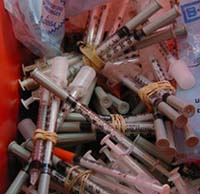Most
people haven't heard of PEP. I hadn't heard about it until I starting
working in HIV prevention, but even there it doesn't get talked about
too often. The basic idea of PEP is that by taking
So,perhaps it's the morning after a one night stand and you didn't use a
condom and don't know your partner's status. Perhaps the condom broke
with your positive partner. Perhaps your were sexually assaulted. Maybe
you shared a needle with someone who is positive. There are lots of
situations we can find ourselves where we may be at risk for HIV
infection. While there are many things we can do in the moment to
reduce risk, e.g. wear a condom, use lube, participate in a needle
exchange program, etc. we generally don't think about things we could do AFTER a
potential exposure to HIV. That's where PEP comes in.

If you think you may have recently been exposed to HIV and are worried
about it, it might be worth looking into PEP. In MA, you should be able
to get it for free through
also foot the bill, if you have it. Either way, you risk either the
State (HDAP) or a private company knowing that you take PEP. While this
may not be a big deal for some people, others may have concerns about
this.

Witht the development of HIV meds over the years, there has also been a development of PEP. This means that PEP no longer involves taking meds that will give you terrible stomach aches (hopefully). Right now, the standard PEP med is called Truvada
and has relatively few side effects.
So, where does one actually get PEP? You can go to an emergency room, or see your physician. Fenway
Community Health is one place that has a lot of experience with PEP and
generally has same-day appointments. Ideally, you want to start PEP as
soon as possible, but it's generally deemed acceptable to start within
36 or 72 hours of exposure.
The exact effectiveness of
PEP is still unclear. There is research currently being done on it, and
initial signs indicate that it can help prevent infection. Still, PEP
is not something to
rely on.
For those of you paying attention, you may
remember I've blogged about PEP before. I'll probably blog about it
again. I think it's a hidden method of HIV prevention that we should be
talking about more. I'm curious if other people have heard of it, taken
it, think people know about it, would take it, etc.
Thoughts?
No comments:
Post a Comment